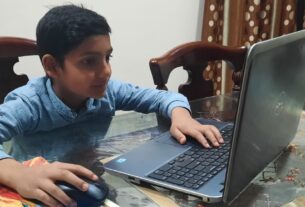After a year of the COVID-19 pandemic, schools in Haryana seem to have stabilised their operations while teachers continue to suffer.
Sonepat: Teachers continue to struggle on a low salary during the second wave of the pandemic while schools seem to recover their losses. Working on a sum that is 50 to 70 percent of their salary has not been easy for the school teachers this past year.
Anil, a senior physics teacher in G.D. Goenka International School, Sonepat, has been getting 60 percent of his salary per month. Being the sole earner of his family, he continues to face financial problems at home. “The entire academic year 2020-21, I have worked on a deducted salary. And the salaries often get delayed by months,” he said. “Since the financial burden was sudden and increasingly high in the first five to six months of the pandemic, I decided to do alternative work .” Anil has now started his coaching classes online. “My workload has surely increased, but it also helped me sustain my livelihood during this time,” he added.
Pooja, a school teacher at Rishikul World Academy, Sonepat said, “The school’s paying 50 percent to 70 percent of salaries to the staff, varying from teacher to teacher. The decision was solely made by the management.”
She added, “With increased expenses during the pandemic — on face masks, hospital bills, medicines, etc — and decreased income, the finances at home have become difficult to manage.”
A large portion of salaries come from the annual development charges a school takes from parents, according to Renu Aneja, Academic Director, RED Group of Schools, Haryana. “Since parents are now less reluctant to pay tuition fees on time, schools are able to stabilize their operations. However, it’s still difficult to collect annual development charges from them,” she said.
Aneja explained, “According to a government notification last year, schools were not allowed to take annual development charges from parents. Schools have not yet received any order from the government for this academic year 2021-22 that says they cannot take annual development charges from parents. Parents continue to follow last year’s government order. This has continued to make it harder for schools to pay complete salaries to their staff on time despite recovering some of their losses.”
Aneja said that schools incurred huge losses last year because parents delayed payment of tuition fees during the lockdown and many withdrew their children’s admissions from schools. “But when the government relaxed lockdown restrictions in December 2020 and January 2021, and when schools began to take a few offline classes, parents seemed to relax. As schools started receiving pending tuition fees, losses lessened,” she said. “In that sense schools were relatively able to resume their operational pace.” She added, “Even though we are doing better than before, it’s unfortunately not enough to timely pay teachers. The second wave of the pandemic and the subsequent lockdown has also slowed down the recovery pace.”
Gurmeet Kaur, Operations Head, Presidium Schools, said that work has to be done on three fronts. “First, schools need to do their best to decrease operational cost, and draw effective provisions to make sure a situation like this doesn’t come at the expense of teachers,” she said. “Second, focus on annual development charges as much as one does on tuition fees. Goodwill helps established institutes but schools that are not yet established should try and prioritize a section of funds for teachers and working staff,” she added.
“And lastly, all schools should learn from the events of last year and develop a monetary reserve that helps them in case a crisis like the coronavirus pandemic happens again,” said Gurmeet.
Shanta Sharan, a Delhi based educationist said that one of the alternatives could be corporate sponsorship and individual donation. “I’ve been working with schools that have been able to pay their teachers and maintain their operations on sponsorships and donations. That can certainly be a way out,” she said. “Moreover, if profit-sharing between the management is reduced, that extra share of money can surely be used to pay teachers.”



